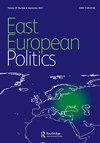Dynamics of social protection spending in the post-communist countries of Eastern Europe and the former Soviet Union: an enduring legacy of the transition shock?
IF 3.1
2区 社会学
Q1 AREA STUDIES
引用次数: 0
Abstract
ABSTRACT The post-communist countries diverge massively with regard to social protection spending. This paper investigates its causes by estimating random-effects models using time-series cross-sectional data (1995–2019) for twenty-three transition countries. We find that part of the divergence relates to the severity of the economic shock suffered in the first years of transition, as well as economic performance and participation in global trade in the subsequent years. Surprisingly, the degree of democracy is not related to welfare spending, but post-communist countries do spend more when their population includes a larger proportion of elderly people and when unemployment rates are higher.东欧和前苏联后共产主义国家社会保障支出的动态:转型冲击的持久遗产?
后共产主义国家在社会保障支出方面存在巨大分歧。本文通过使用时间序列横断面数据(1995-2019)估计23个转型国家的随机效应模型来研究其原因。我们发现,部分差异与转型头几年遭受的经济冲击的严重程度有关,也与随后几年的经济表现和参与全球贸易有关。令人惊讶的是,民主程度与福利支出无关,但后共产主义国家在人口中老年人比例较大、失业率较高时,福利支出确实会增加。
本文章由计算机程序翻译,如有差异,请以英文原文为准。
求助全文
约1分钟内获得全文
求助全文

 求助内容:
求助内容: 应助结果提醒方式:
应助结果提醒方式:


